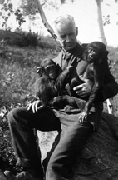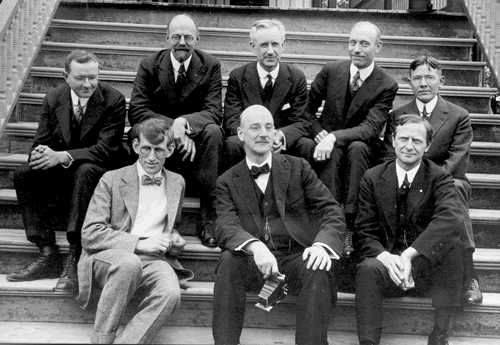
(1876-1956)
American Comparative Psychologist
Influences
- Student of:
- Influenced by:
- Students:
- Influenced: Wechsler
- Time Period: The Great Schools’ Influence
Education
- Ursinus College, Pennsylvania (1892-1897)
- Harvard University, A. B. (1898); Ph.D. (1902)
- While on leave from his teaching job at Harvard, Yerkes studied neuro-surgical techniques with Harvey Cushing at the Hunterian Laboratory at Johns Hopkins University. He also spent several weeks with E.B. Titchener at the Marine Biological Laboratory at Woods Hole, MA.
Career
- Harvard University, Instructor and Assistant Professor in Comparative Psychology (1902-1917)
- Boston Psychopathic Hospital, Director of Psychological Services and Research (1913-1917)
- Helped create the Yerkes-Bridges Point Scale of Intelligence (1915)
- President, American Psychological Association (1917)
- Chairman, National Research Council Psychology Committee (WWI)
- Chairman, Committee on the Psychological Examination of Recruits (The committee that designed the WWI Army Alpha and Beta testing program)
- Continued to serve on the National Research Council (1919-1924)
- Yale University, Professor of Psychobiology (1924-1944)
- Founded and directed the Yale Laboratories of Primate Biology (1929-1941)
Definition of Intelligence
“…the term intelligence designates a complexly interrelated assemblage of functions, no one of which is completely or accurately known in man…(Yerkes, 1929, p. 524)”
Major Contributions
- Founded the first non-human primate research laboratory in the United States, and acted as its director from 1929 until 1941. The Yale Laboratories of Primate Biology was eventually renamed the Yerkes National Primate Research Center
- Chaired the committee that created the WWI Army Alpha and Beta intelligence tests
Ideas and Interests
Robert Yerkes is most famous for his comparative psychology work with apes and chimpanzees. He was heavily influenced by Darwinism, and his writing emphasized that the cognitive differences between infrahuman primates and humans is often simply a matter of degree:
…The study of other primates may prove the most direct and economical route to profitable knowledge of ourselves, because, in them, basic mechanisms are less obscured by cultural influence. Certainly it is unwise to assume that human biology can be advanced only by the study of man himself. This could be true only if he existed as a unique organism, lacking genetic relations to other types of creatures (Yerkes, 1943, p. 3).
Yerkes rejected social Darwinism; that is, he dismissed the popular ideological belief that natural selection would gradually lead humanity to a sort of utopian ideal. He embraced the eugenicist view and argued, albeit gently, that humankind could benefit from intentional, selective interbreeding. Although he never advocated a political agenda, he hoped that the chimpanzee colonies established at the Yale Laboratories would popularize the idea that genetic research could improve society:
We realize that with varying wisdom man has learned to shape nature to his needs and desires. Only with his own nature has he refrained from tampering. Yet the course of civilization and any sudden change for better or worse in the human type obviously depend upon consciously or unconsciously directed modifications. Probably there is no more unprofitable assumption than that of the unalterability of human nature…It has always been a feature of our plan for the use of the chimpanzee as an experimental animal to shape it intelligently to specification instead of trying to preserve its natural characteristics. We have believed it important to convert the animal to as nearly ideal a subject for biological research as is practicable. And with this intent has been associated the hope that the possibility of re-creating man himself in the image of a generally acceptable ideal.
… the effort to create an ideally suitable laboratory chimpanzee may prove useful to those who are seeking an ideal for mankind. One is led to think at once of generally recognized human shortcomings, such as extreme selfishness, dishonesty, slothfulness, cruelty, and to wonder whether by developing an ape notable for its dependability, trustworthiness, consideration of others, measure of self-control, and cooperativeness, and by exhibiting it extensively and impressively, attention might not be focused on the problem of improving human nature and the possibilities of its solution. Possibly such an exhibit, carried to mankind pictorially and verbally, might shame a portion of our kind into resolving to do something about it instead of continuing to be carelessly fatalistic. …The really important things for us at present are recognition and active acceptance of the principles of modifiability, controllability, and consequent improvability, of human nature (Yerkes, 1943, p. 9-11).
Yerkes’s eugenicist goals were not carried to fruition, but he did leave an important cultural and psychological legacy. Immediately after the United States entered the First World War, Yerkes urged the American Psychological Association to contribute psychological expertise to the war effort. The APA responded by deploying twelve committees. Yerkes chaired both the National Research Council Psychology Committee and the Committee on the Psychological Examination of Recruits. This second committee was charged with developing group intelligence test that could identify recruits with low intelligence and allow the Army to recognize men who were particularly well-suited for special assignments and officers’ training schools (McGuire, 1994).

Members of the Committee on the Psychological Examination of Recruits
The committee met for the first time in May of 1917. Among others, it included Henry Goddard, Lewis Terman, and Walter Bingham. By mid-July they had constructed five alternate forms of the verbal test, henceforth to be known as the Army Alpha, and had designed the Army Beta, a nonverbal test for illiterate and non-English speaking recruits (Dahlstrom, 1985). The final forms of the Army Alpha and Beta tests were published in January of 1919, and by the end of the war they had been administered to approximately two million men (Larson, 1994; McGuire, 1994).
For many reasons, the launch of the Army Alpha and Beta testing program was a pivotal moment in the history of psychology. First, it provided psychometricians with the first group intelligence tests. Second, the publicity it generated popularized intelligence testing in the public and private sectors. Third, the program provided vast amounts of data to serve as fuel for future controversies over apparent racial differences in intelligence test scores and the supposed decline of America’s “national intelligence” (Fancher, 1985).
Selected Publications
Yerkes, R. M. (1930). Autobiography of Robert Mearns Yerkes. In C. Murchison (Ed.), History of psychology in autobiography (Vol. 2, pp. 381-407). Worcester, MA: Clark University Press.
Yerkes, R. M. (1916/1979). The mental life of monkeys and apes: a study of ideational behavior. Delmar, NY: Scholars’ Facsimiles and Reprints.
Yerkes, R. M. (Ed.) (1921) Psychological examining in the United States Army. Memoirs of the National Academy of Sciences, 15, 1-890.
Yerkes, R. M., & Yerkes, A. W. (1929). The great apes: a study of anthropoid life. New Haven: Yale University Press.
Yerkes, R. M., Bridges, J. W., & Hardwick, R. S. (1915). A point scale for measuring mental ability. Baltimore: Warwick & York.
Yerkes, R. M. (1941). Man-power and military effectiveness: the case for human engineering. Journal of Consulting Psychology, 5, 205-209.
Yerkes, R. M. (1943, 1971). Chimpanzees: A laboratory colony. New York: Johnson Reprint Corporation.
References
Dahlstrom, W. G. (1985). The development of psychological testing. In G. A. Kimble and K. Schlesinger (Eds.), Topics in the history of psychology (Vol. 2, pp. 63-114).
Fancher, R. E. (1985). The intelligence men: Makers of the IQ controversy. New York: W. W. Norton & Company.
Larson, G. (1994) Armed services vocational aptitude battery. In R.J. Sternberg (Ed.), Encyclopedia of intelligence (Vol. 1, pp. 121-124.) New York: Macmillan.
Krawiec, T. S. (Ed.). (1974). Yerkes, R.M. In The psychologists, (Vol 2). London: Oxford University Press.
Legassé, P. (Ed.). (2001). Yerkes, Robert Mearns. The Columbia Encyclopedia ( 6th ed.) [Online Version]. New York: Columbia University Press. Retrieved June 5, 2002.
McGuire, F. (1994). Army alpha and beta tests of intelligence. In R. J. Sternberg (Ed.), Encyclopedia of intelligence (Vol 1, pp. 125-129.) New York: Macmillan.
Wolman, B. B. (1968). Historical roots of contemporary psychology. New York: Harper & Row.
Yerkes, R. M. (1932). Psychobiologist. In Carl Murchison (Ed.), The history of psychology in autobiography. (Vol. 2, pp. 381-407). Worcester, MA: Clark University Press. Full text for this chapter is available online from the Classics in the History of Psychology website.
Photo on top left Courtesy of the U.S. Army Research Institute, Alexandria Virginia
Photo on top right courtesy of the Yerkes National Primate Research Center
Photo in center of profile is courtesy of the U.S. Army Research Institute, Alexandria Virginia
